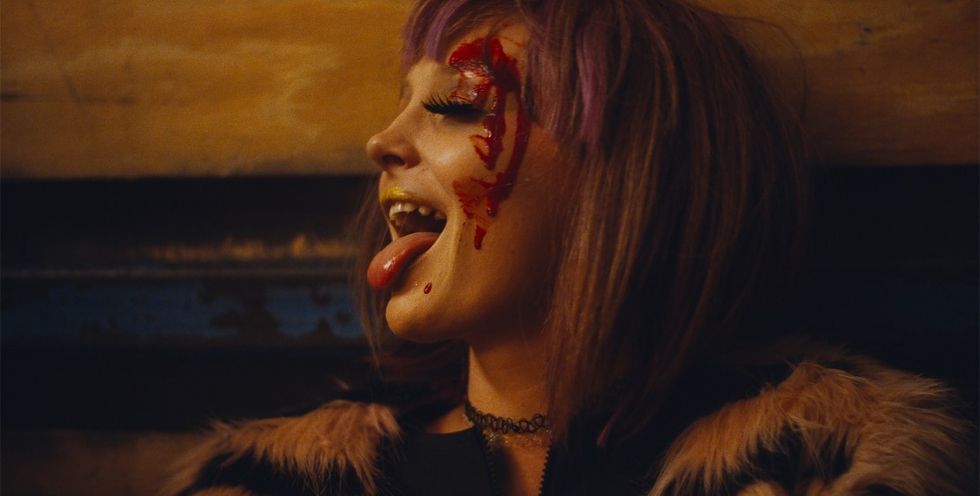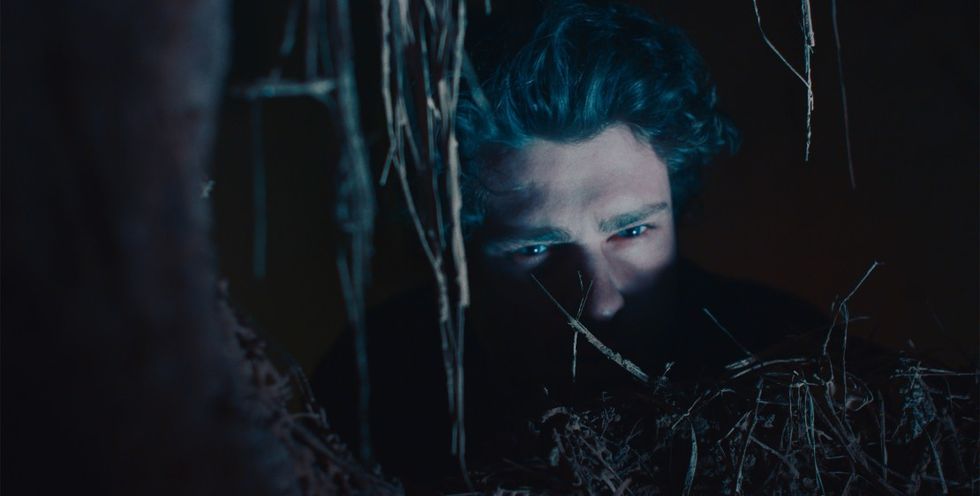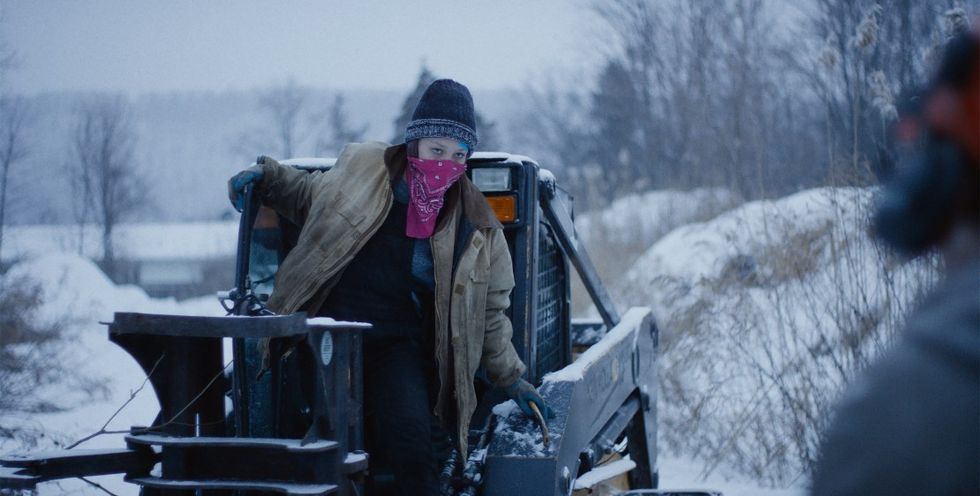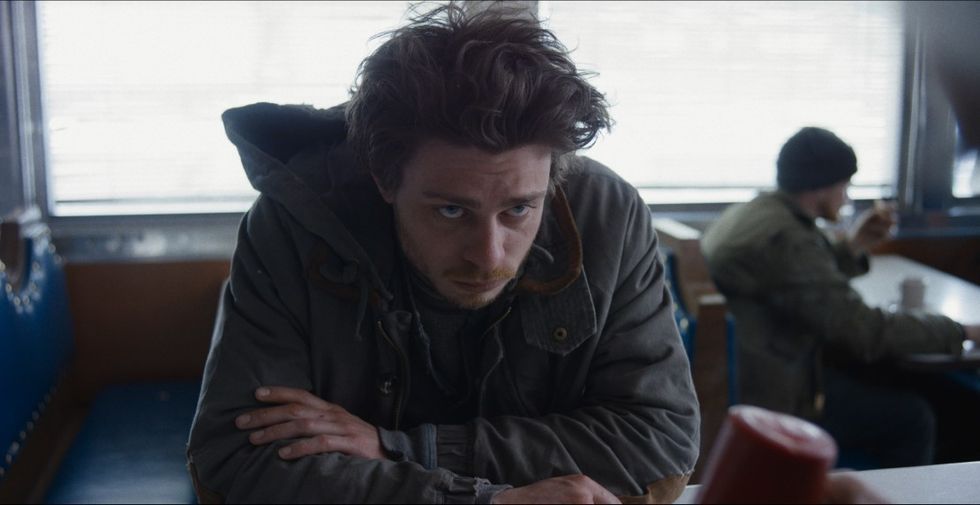How a Filmmaker Turned His Own Compulsion into a Horror Love Story
Director Xander Robin's 'Are We Not Cats' is deeply personal and unafraid of taking viewers along for the ride.

Everyone has an inner weirdness. Getting comfortable with it is a different matter entirely. Predisposed as we are to hide these parts of our strangest traits, the suggestion of finding humor in them sounds laughably impossible. Enter Xander Robin, whose capacity to embrace the strangest parts of himself and his willingness to make them visible on screen is what makes his feature debut, Are We Not Cats, unmissable.
With a knack for finding beauty in the most unlikely places, Robin creates tones and textures so forceful that you become enveloped by details that reach near tangible levels of immediacy. Haplessly reckless and unashamedly filthy, Eli (Michael Patrick Nicholson) plows onward through an existential tailspin of which he is not yet aware, allowing the breadcrumb generosity of his man-child friends, the maniacal insanity of a bro drinking antifreeze, and the kindness of weird dads to carry him merrily along into the backwoods of New York, where he finds comfort in sinister vulnerability.
Delightfully dry and as interested in tangential conversation as I am, Xander Robin sat down with No Film School to discuss the poetics of filth, anxiety imagery, and finding humor in the things of which we are most ashamed.
No Film School: Where did this crazy storyline come from? What was the initial germ?
Xander Robin: It began with an image and a reframed thought. The image was of two people embracing after having pulled out each other’s hair and by unlocking a different way of thinking about all the things I thought made me such a freak when I was younger, I was able to find a way to incorporate hair, skin, and nails to create a different form of horror in this storyline that sprang from the image.
Ever since I was 12, I’ve had a mild case of trichotillomania, which is a disorder that involves recurrent, often irresistible urges to pull out body hair. It’s one of the compulsive ways anxiety expresses itself in my body. I had read about it enough when I was younger just by searching on the internet and learned that this is a real disorder that exists and that there are people with much more severe cases than I have.
Hearing all these people share their own experience with the disorder made me realize I wasn’t as weird as I thought I was. You know, because it wasn’t something I really talked about. It doesn’t really lend itself well to dinner conversations. Finding the forum made me feel like less of a freak.
"I was even comparing it to the idea of dating someone who smoked a lot. I don’t smoke at all, but what if I met someone that smokes a lot? I’d probably end up smoking a lot too."
In college, I only wanted to make movies about romance, but those early efforts didn't feel the way I felt inside. By the end of college, I had started to tie in the body anxieties into romance movies as a way to evoke in the viewer the physical and emotional feelings as I experience them.
I started weaving them in as a kind of abstract horror device to make it feel much more personal, much more visually stimulating and fun. When I started putting the idea together for Are We Not Cats, I thought, why not make it much more specific to trichotillomania and the visceral horrors of trichophagia (which is hair eating).
With that as my starting point, I thought, "okay! I want to make another romance-horror movie that’s about a guy with mild trichotillomania who meets someone with severe trichotillomania" and see how, as the relationship unfolds, their compulsions escalate.
At the time, I was even comparing it to the idea of dating someone who smoked a lot. I don’t smoke at all, but what if I met someone that smokes a lot? I’d probably end up smoking a lot too. And if I ended up smoking a lot too, maybe they would smoke even more! It’d be this wild snowball effect It’d be this wild snowball effect of treating your body badly to increasing degrees.

NFS: The way you shoot the body—the plucking of a hair or scratching a rash—added a frightening level of physicality to the film that's not unlike torture porn. But then there’s the added layer of vulnerability and self-consciousness because of the way this physicality expresses itself in the shame of bearing your body in a relationship. The images had an emotional valence to them. In doing so, you’re integrating the physical symptoms of anxiety with the mental state. I really haven't seen that done before in film.
Robin: I wanted to capture that crazy feeling of trying to get at a hair you can’t quite grasp. You’re determined to get the satisfaction of pulling it out, so you keep trying, sometimes destroying all the skin around it in the process. And when you finally do, when you finally pull out the hair, it doesn’t feel as satisfying as you thought it would be. Then you just kind of want to keep going and going until you finally find that single hair that feels immensely rewarding to pull out…. but it doesn’t exist. It’s a false reward.
You might know the feeling in another way, because it’s even like threading a needle. I wanted that feeling to come across most of the movie and even in the relationship between Anya and Eli. It’s a feeling I know very well and an image of which I know every crucial detail.
Close-ups on these physical manifestations of anxiety: pulling a hair, using a remote control to de-gunk a fingernail, and picking at a rash were really why I wanted to make this movie. That’s what I meant by hair, skin, and nails: they were the images that Are We Not Cats needed every few minutes. [Laughs]
"Sometimes it almost feels like this movie was made by a Martian. It sets up things that don't pay off and it can feel chaotic."
NFS: If you described that feeling to me before I saw the movie, I wouldn’t have identified. I would struggle to relate. When I watched the film though, I felt familiarityin those images and their details.
Robin: You know, it's weird, because I feel like the script resonated with some people and not with others. The movie relies so much on its tone and the feeling in its imagery, each single image. Sometimes it almost feels like this movie was made by a Martian. It sets up things that don't pay off and it can feel chaotic, but what I think always resonates are these little details that create the film's texture.
People say that the story of a movie is everything, when really the movie is everything. The narrative is just one of many things that come together to create this whole experience with all its elements in conversation.
I think Alfonso Cuaron said it best: “When you're doing a film, narrative is your most important tool, but it's a tool to create a cinematographic experience, to create those moments that are beyond narrative, that are almost an abstraction of that moment that hits your psyche.”
"As a filmmaker, you have the movie in your head that you want to see made, and then there's the movie you're capable of making."
NFS: There is a real specificity to the filth in this film. Especially at the beginning of the movie when we’re seeing these absurdly barbaric living situations. How much are these environments drawn from your actual experience?
Robin: That’s just something you see a lot of when you’re between the ages of 19 and 25. You see a lot of people living in apartments with black mold, probably, but the shower sequence in the film comes from an actual experience I had when I was in Boston.
We were staying at this place through a friend of ours, and one night I was having a bit of a panic attack and needed a shower to calm down. I walk into the bathroom and find that it’s actually covered in hair and there’s no shower head and I can’t even get it to turn on. I’m freaking out at this point and call the owner and ask, “hey… uh… what’s up with this shower? How do I use it?”
They send over some person with a wrench that I’ve never met before and who goes into the shower and twists the pipe a bit until there’s this little dribble of hot water. He says to me, “This is what we use.”
I remember asking my friend who was the connection to the house, i.e. “what’s the deal with this place?” and his response was, “chill out, man. Don’t criticize someone’s space. That’s rude.” I was like, “oh, okay! Yeah, that totally makes sense.” When you’re just learning how to live as an adult, accepting filth felt logical.

NFS: The environments you’ve created sometimes feel just as forceful as the excruciating minutiae of those little hair-picking details. The Sludge Club, where Eli first meets Anya, was especially powerful. I felt totally enveloped by it.
Robin: I wrote the club scene in particular based on feelings alone. I wanted it to feel super drawn out, like when you’ve been at a party way too long and there’s this underlying feeling of doom, but it’s also kind of electric. It's funny to imagine the bigger budget version of this scene because it exists!
As a filmmaker, you have the movie in your head that you want to see made, and then there's the movie you're capable of making. The goal is finding a way to bridge the gap between the two worlds, to get them to overlap as best as you can.
I imagined the club to feel more abstract, almost surreal and Eraserhead-esque with a monochromatic color palette of dark gray. It would be a bit more fantastical. I essentially wanted the club to be this sea of mud, full of naked people, and I wanted there to be a band floating on a stage in the middle of this mud pit that kept sinking deeper and deeper into the muck.
Of course, as soon as we started filming it morphed into something else. What we ended up with was something a bit more colorful and way more practical for a basement warehouse. The band played on a stage made out of tires that didn't float.
We had two artists read the script to help us with the set and they basically created this club out of dirt in the basement of a warehouse in Staten Island. It ended up looking pretty cool, I think. A little bit different, yes, but in terms of practicality, it fit the production much better.

NFS: Can you describe your approach to filmmaking?
Robin: When I write, I think about creating an environment that’s flexible, where something a little bit different than what’s written can happen. There are also writers and directors that want their film to play out exactly the way it’s written. Everyone has a different approach to making movies. There’s really no one way.
Had I known a little bit more about the film industry back then, I probably wouldn’t have made a movie like this, but that’s also what makes it interesting. There were no calculations or presumptions. It just was.
I guess it didn’t really occur to me how crazy the film sounded on paper. The hardest part was convincing people that it was going to be good and that we could make it good. I don’t want a crew that’s just clocking in and clocking out. I need a crew that understands it and is as invested as I am in making the movie good. The crew working on this film was pretty amazing. Any integrity of the project shines through because of them.
"I think it’s interesting that the quarter-life crisis is considered a bad thing to do in film or something of a cliché. Maybe it's because we often see it portrayed in an ironic way and that makes it feel trivial."
NFS: This film is truly singular and yet familiar at the same time. If one were to generalize, you could describe Are We Not Cats as the evolution of Eli the man-child during his quarter-life crisis, but somehow, you’ve managed to escape all the usual trappings of cliché.
Robin: You know, I think it’s interesting that the quarter-life crisis is considered a bad thing to do in film or something of a cliché. Maybe it's because we often see it portrayed in an ironic way and that makes it feel trivial. I think there's something very poetic about the filthiness of it.
There these houses of filth, our friends are living in the filth, we're living in the filth, and we all accept the life of filth. The unglamorous rite of passage is that moment when you realize "no, I can no longer accept this filth." And when does that happen?
NFS: There’s this unsettling strangeness that’s operating throughout that I think counteracts any kind of easy, archetypal interpretation of the film. Michael’s performance lends itself well to the tone and builds out Eli’s character nicely. Especially early on in the film when he tries to turn the end of his garbage route into this opportunity for both a booty call and a shower. His obliviousness and his smile after she rejects him was so weirdly off and yet so perfect.
Robin: Yeah, I love that smile. That was Michael breaking character, but it was one of those fortuitous things. I’ve always thought someone smiling was way sadder than when someone’s just sad.

NFS: Can you tell me a little bit about developing Eli’s character?
Robin: In the original script, Eli's character was very different, way more like my dad. His name was Boris and I imagined him to be this first generation American that had no understanding of social cues. At the time, we even talked about giving him an Eastern European accent. I had worked with Michael on the first film that I really became myself on called The Virgin Herod, so I knew I wanted to work with him.
When we started making the short that eventually turned into Are We Not Cats, it became clear that Boris didn't totally fit Michael. So, the character sort of evolved and took on a little bit of me, a little bit of my dad, and a little bit of Michael. And those parts of us express themselves differently in relation to other people in the film: there's Eli around friends, Eli around weird dads, and Eli around women.
I knew I wanted to surround Michael with weird dads. I guess I was inspired by the fact that I always end up in rooms with weird dads. They're drawn to me or something. There's this instant connection that feels comfortable and familiar, but it also feels like nothing at the same time. Occasionally, they make me feel more comfortable in situations when I really shouldn't be.
" I wanted the "love scene" to feel desperate and sad rather than romantic."
NFS: What was Michael able to bring to the character?
Robin: Michael offers a lot of himself to the films he works on. He’s very generous with what he gives to a performance, which I think comes from his willingness to find a way to relate. Michael understands what it's like to be a defeatist. He understands the chaos that comes from living life on other people’s terms and doing so, not because you have to, but more because he’s kind of like… why not? There’s a sort of recklessness in that.
NFS: There was a lot of unpredictability in the romantic dynamic between Anya and Eli. Genuine expressions of tenderness don’t really come in the form of sex. The sex scene is actually kind of uncomfortable.
Robin: Yeah, I wanted the "love scene" to feel desperate and sad rather than romantic. If there’s a sexuality to it, it’s more of the one-night stand variety, rather than something sweet. And essentially, it ends in this dark way. I wanted the surgery scene, to feel more tender and romantic. It’s graphic, intimate, and sticky, but it’s not just straight horror. [Laughs] That’s the only scene with penetration. But I don’t really know if I want to unpack it!
'Are We Not Cats' is currently on most digital platforms.













